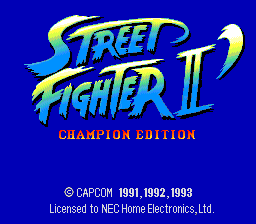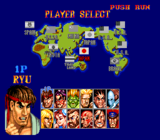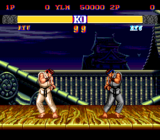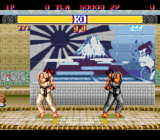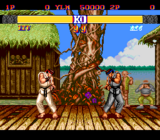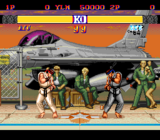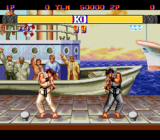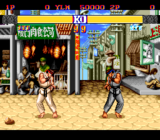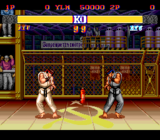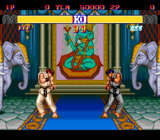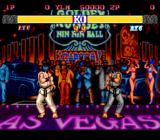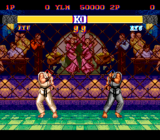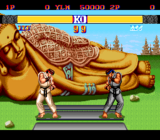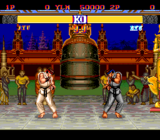Difference between revisions of "Street Fighter II': Champion Edition"
From NEC Retro
TyphoonNEC (talk | contribs) m (→Bonus stages) |
|||
| (7 intermediate revisions by 2 users not shown) | |||
| Line 1: | Line 1: | ||
{{Bob | {{Bob | ||
| − | | bobscreen=SF2CE | + | | bobscreen=SF2CE PCE Title.png |
| publisher=[[NEC Home Electronics]] {{company|[[Capcom]]|system=VC}} | | publisher=[[NEC Home Electronics]] {{company|[[Capcom]]|system=VC}} | ||
| developer=[[Capcom]] | | developer=[[Capcom]] | ||
| − | | originalsystem=Arcade | + | | originalsystem=Arcade (Capcom CPS-1) |
| system=[[PC Engine]], [[Virtual Console]] (Wii) | | system=[[PC Engine]], [[Virtual Console]] (Wii) | ||
| peripherals=[[Arcade Pad 6]] | | peripherals=[[Arcade Pad 6]] | ||
| Line 29: | Line 29: | ||
| otherformats={{NonNEC|Arcade|MD}} | | otherformats={{NonNEC|Arcade|MD}} | ||
}} | }} | ||
| − | '''''{{PAGENAME}}''''' | + | '''''{{PAGENAME}}''''', or '''''Street Fighter II Dash''''' (ストリートファイターⅡダッシュ) as it is officially pronounced in Japan, is a port of the 1992 arcade game of the same title released for the [[PC Engine]]. It was the second and last ''Street Fighter'' game released for the platform, following ''[[Fighting Street]]'' (a retitled port of the original ''Street Fighter''). |
| + | |||
| + | Unlike its predecessor, which was one of the first PCE games released in [[CD-ROM²]] format, the PCE version of ''Champion Edition'' was a 20-Megabit [[HuCard]], which was the largest ROM size that the format was ever available in. As a result, the ''Champion Edition'' HuCard is a bit thicker than other releases. | ||
==Gameplay== | ==Gameplay== | ||
| + | {{ScreenThumb|SF2CE PCE Select.png|align=left|width=200|Character select}} | ||
''Street Fighter II'' has a long (and often complex) lineage dating back to the 1991 release of ''Street Fighter II: The World Warrior'', a sequel to the 1987 arcade game ''Street Fighter''. Two updates to the game were released as ''Street Fighter II': Champion Edition'' and ''Street Fighter II' Turbo: Hyper Fighting'' in March and December 1992, respectively. Each of the updates attempted to further balance gameplay as well as offering new features such as faster gameplay and more moves. | ''Street Fighter II'' has a long (and often complex) lineage dating back to the 1991 release of ''Street Fighter II: The World Warrior'', a sequel to the 1987 arcade game ''Street Fighter''. Two updates to the game were released as ''Street Fighter II': Champion Edition'' and ''Street Fighter II' Turbo: Hyper Fighting'' in March and December 1992, respectively. Each of the updates attempted to further balance gameplay as well as offering new features such as faster gameplay and more moves. | ||
The PCE version of ''Champion Edition'' was the second console release in the ''Street Fighter II'' series, following the Super NES version of ''Street Fighter II: The World Warrior'' released the previous year. The PCE ''Champion Edition'' was considerably more accurate to the arcade version compared to the SNES ''World Warrior'', as it has more accurately drawn ending sequences and retains all of the announcer's voice clips (such as when counting down during the continue screen or when mentioning a country's name before a match), and it even restores the barrel-breaking minigame that was missing in the first SNES game. However, it lacks the Turbo mode that was later added in ''Street Fighter II Turbo: Hyper Fighting'' for the SNES, as well as in ''{{SegaLink|Street Fighter II′: Special Champion Edition}}'' for the Mega Drive. | The PCE version of ''Champion Edition'' was the second console release in the ''Street Fighter II'' series, following the Super NES version of ''Street Fighter II: The World Warrior'' released the previous year. The PCE ''Champion Edition'' was considerably more accurate to the arcade version compared to the SNES ''World Warrior'', as it has more accurately drawn ending sequences and retains all of the announcer's voice clips (such as when counting down during the continue screen or when mentioning a country's name before a match), and it even restores the barrel-breaking minigame that was missing in the first SNES game. However, it lacks the Turbo mode that was later added in ''Street Fighter II Turbo: Hyper Fighting'' for the SNES, as well as in ''{{SegaLink|Street Fighter II′: Special Champion Edition}}'' for the Mega Drive. | ||
| − | Because the standard PC Engine [[Pad]] at the time only featured two action buttons ({{I}} and {{II}}), [[NEC Avenue]] produced the [[Avenue Pad 6]] specifically for ''Street Fighter II′'', which adds four more action buttons ({{III}}, {{IV}}, {{V}} and {{VI}}). With this controller, {{IV}}, {{V}} and {{VI}} are | + | The single-player mode consists of twelve matches against computer-controlled opponents, always concluding with the four Shadaloo bosses M. Bison, Balrog, Sagat, and Vega. A second player can enter at any time to challenge the first by pressing {{Run}}, with the victor continuing in the tournament. There are eight different difficulty levels for computer-controlled opponents. After every three matches, the player plays a bonus stage. Beating the game on the highest difficulty level unlocks a special ending sequence. There is a dedicated two-player V.S. Battle mode where players can choose a handicap and pick any stage to play. |
| + | |||
| + | Because the standard PC Engine [[Pad]] at the time only featured two action buttons ({{I}} and {{II}}), [[NEC Avenue]] produced the [[Avenue Pad 6]] specifically for ''Street Fighter II′'', which adds four more action buttons ({{III}}, {{IV}}, {{V}} and {{VI}}). With this controller, punches are done with {{IV}} (jab), {{V}} (medium) and {{VI}} (fierce), and kicks are done with {{III}} (short), {{II}} (medium) and {{I}} (roundhouse). Light attacks are faster and hard attacks deal more damage. Special moves for each character are done by pairing specific directional combinations with an attack button. When played on a standard controller, {{Run}}, {{II}} and {{I}} are used as general attack buttons, while {{Select}} toggles between punches and kicks. | ||
| + | |||
| + | Throws and grabs are done by holding the D-Pad toward an opponent and pressing a medium or hard punch or kick button. Different characters have different throws available to them. Throws cannot be blocked. Blocking is done by holding the D-Pad away from the opponent, with special moves still doing a small amount of "chip damage" if blocked. Characters can become dizzy from being attacked repeatedly; they are uncontrollable and vulnerable in this state but can recover more quickly by rapidly pressing back and forth on the D-Pad along with the attack buttons. It is also possible to escape grabs in this way. | ||
===Characters=== | ===Characters=== | ||
| − | ''Champion Edition'' contains the eight original cast members of ''Street Fighter II'', plus the four originally unplayable "Grand Masters". | + | ''Champion Edition'' contains the eight original cast members of ''Street Fighter II'', plus the four originally unplayable "Grand Masters". Every character has two selectable color schemes, one chosen by pressing any attack button and a secondary color scheme chosen with {{Run}} (and also used for mirror matches). |
| + | |||
:'''Note:''' Move lists assume the player is facing right. If facing left, {{left}} and {{right}} should be reversed. {{punch}} refers to any of the punch buttons, while {{kick}} refers to any of the kick buttons. For moves that require pressing all three {{punch}} or {{kick}} buttons, pressing any two buttons will also work. | :'''Note:''' Move lists assume the player is facing right. If facing left, {{left}} and {{right}} should be reversed. {{punch}} refers to any of the punch buttons, while {{kick}} refers to any of the kick buttons. For moves that require pressing all three {{punch}} or {{kick}} buttons, pressing any two buttons will also work. | ||
{{InfoTable|imagewidths=56| | {{InfoTable|imagewidths=56| | ||
| Line 258: | Line 266: | ||
}} | }} | ||
}} | }} | ||
| + | ===Stages=== | ||
| + | Each character has his or her own stage where matches are hosted. The stage can be manually chosen in the two-player mode. | ||
| + | <!--{{gallery|widths=200|screens=yes|--> | ||
| + | {{gitem|width=200|screen=yes|SF2CE PCE Stage Ryu.png|{{flag|JP}} Ryu}} | ||
| + | {{gitem|width=200|screen=yes|SF2CE PCE Stage EHonda.png|{{flag|JP}} E. Honda}} | ||
| + | {{gitem|width=200|screen=yes|SF2CE PCE Stage Blanka.png|{{flag|BR}} Blanka}} | ||
| + | {{gitem|width=200|screen=yes|SF2CE PCE Stage Guile.png|{{flag|US}} Guile}} | ||
| + | {{gitem|width=200|screen=yes|SF2CE PCE Stage Ken.png|{{flag|US}} Ken}} | ||
| + | {{gitem|width=200|screen=yes|SF2CE PCE Stage ChunLi.png|{{flag|CN}} Chun-Li}} | ||
| + | {{gitem|width=200|screen=yes|SF2CE PCE Stage Zangief.png|{{flag|SU}} Zangief}} | ||
| + | {{gitem|width=200|screen=yes|SF2CE PCE Stage Dhalsim.png|{{flag|IN}} Dhalsim}} | ||
| + | {{gitem|width=200|screen=yes|SF2CE PCE Stage Balrog.png|{{flag|US}} M. Bison}} | ||
| + | {{gitem|width=200|screen=yes|SF2CE PCE Stage Vega.png|{{flag|ES}} Balrog}} | ||
| + | {{gitem|width=200|screen=yes|SF2CE PCE Stage Sagat.png|{{flag|TH}} Sagat}} | ||
| + | {{gitem|width=200|screen=yes|SF2CE PCE Stage MBison.png|{{flag|TH}} Vega}} | ||
| + | <!--}}--> | ||
| + | |||
| + | ===Bonus stages=== | ||
| + | A bonus stage appears in the single-player game after every three matches won. Characters destroy inanimate objects within a time limit by attacking them for bonus points. | ||
| + | <!--{{gallery|widths=200|screens=yes|--> | ||
| + | {{ginfo|width=200|screen=yes|Street Fighter II PCE, Bonus Stage 1.png|Bonus stage 1|Characters destroy a car, similar to the first bonus stage of ''{{SegaLink|Final Fight}}''.}} | ||
| + | {{ginfo|width=200|screen=yes|Street Fighter II PCE, Bonus Stage 2.png|Bonus stage 2|Characters destroy rolling barrels as they fall from a conveyor belt.}} | ||
| + | <!--}}--> | ||
==Production credits== | ==Production credits== | ||
| Line 276: | Line 307: | ||
*'''Presented by:''' [[sega:NEC|NEC Home Electronics,Ltd.]] | *'''Presented by:''' [[sega:NEC|NEC Home Electronics,Ltd.]] | ||
| source=In-game credits (JP) | | source=In-game credits (JP) | ||
| + | | pdf=StreetFighterII PCE Credits.pdf | ||
| console=PCE | | console=PCE | ||
}} | }} | ||
| Line 297: | Line 329: | ||
| card=SFIICE card.jpg | | card=SFIICE card.jpg | ||
| cardback= | | cardback= | ||
| − | | manual=StreetFighter II' | + | | manual=StreetFighter II'CE PCE HuCard JP Manual.pdf |
| square=yes | | square=yes | ||
}} | }} | ||
| Line 304: | Line 336: | ||
===ROM dump status=== | ===ROM dump status=== | ||
{{romtable| | {{romtable| | ||
| − | {{rom|PCE|sha1=E757ECDF857803CB46CDF37ECF4596F6EACCDD76|md5=0D9135BE3267876BFEC7F588ABEDA5BB|crc32=D15CB6BB|size=2.5MB|date= |source=Card (JP)|comments=|quality=good | + | {{rom|PCE|sha1=E757ECDF857803CB46CDF37ECF4596F6EACCDD76|md5=0D9135BE3267876BFEC7F588ABEDA5BB|crc32=D15CB6BB|size=2.5MB|date= |source=Card (JP)|comments=|quality=good}} |
}} | }} | ||
| Line 314: | Line 346: | ||
{{SF2CEOmni}} | {{SF2CEOmni}} | ||
| + | {{StreetFighter}} | ||
Latest revision as of 01:59, 19 June 2024
| Street Fighter II': Champion Edition | ||||||||||||||||||||||||||||||
|---|---|---|---|---|---|---|---|---|---|---|---|---|---|---|---|---|---|---|---|---|---|---|---|---|---|---|---|---|---|---|
| System(s): PC Engine, Virtual Console (Wii) | ||||||||||||||||||||||||||||||
| Publisher: NEC Home Electronics Capcom | ||||||||||||||||||||||||||||||
| Developer: Capcom | ||||||||||||||||||||||||||||||
| Original system(s): Arcade (Capcom CPS-1) | ||||||||||||||||||||||||||||||
| Peripherals supported: Arcade Pad 6 | ||||||||||||||||||||||||||||||
| Genre: Fighting | ||||||||||||||||||||||||||||||
| Number of players: 1-2 | ||||||||||||||||||||||||||||||
| ||||||||||||||||||||||||||||||
|
Street Fighter II': Champion Edition, or Street Fighter II Dash (ストリートファイターⅡダッシュ) as it is officially pronounced in Japan, is a port of the 1992 arcade game of the same title released for the PC Engine. It was the second and last Street Fighter game released for the platform, following Fighting Street (a retitled port of the original Street Fighter).
Unlike its predecessor, which was one of the first PCE games released in CD-ROM² format, the PCE version of Champion Edition was a 20-Megabit HuCard, which was the largest ROM size that the format was ever available in. As a result, the Champion Edition HuCard is a bit thicker than other releases.
Contents
Gameplay
Street Fighter II has a long (and often complex) lineage dating back to the 1991 release of Street Fighter II: The World Warrior, a sequel to the 1987 arcade game Street Fighter. Two updates to the game were released as Street Fighter II': Champion Edition and Street Fighter II' Turbo: Hyper Fighting in March and December 1992, respectively. Each of the updates attempted to further balance gameplay as well as offering new features such as faster gameplay and more moves.
The PCE version of Champion Edition was the second console release in the Street Fighter II series, following the Super NES version of Street Fighter II: The World Warrior released the previous year. The PCE Champion Edition was considerably more accurate to the arcade version compared to the SNES World Warrior, as it has more accurately drawn ending sequences and retains all of the announcer's voice clips (such as when counting down during the continue screen or when mentioning a country's name before a match), and it even restores the barrel-breaking minigame that was missing in the first SNES game. However, it lacks the Turbo mode that was later added in Street Fighter II Turbo: Hyper Fighting for the SNES, as well as in Street Fighter II′: Special Champion Edition for the Mega Drive.
The single-player mode consists of twelve matches against computer-controlled opponents, always concluding with the four Shadaloo bosses M. Bison, Balrog, Sagat, and Vega. A second player can enter at any time to challenge the first by pressing RUN , with the victor continuing in the tournament. There are eight different difficulty levels for computer-controlled opponents. After every three matches, the player plays a bonus stage. Beating the game on the highest difficulty level unlocks a special ending sequence. There is a dedicated two-player V.S. Battle mode where players can choose a handicap and pick any stage to play.
Because the standard PC Engine Pad at the time only featured two action buttons (Ⅰ and Ⅱ), NEC Avenue produced the Avenue Pad 6 specifically for Street Fighter II′, which adds four more action buttons (Ⅲ, Ⅳ, Ⅴ and Ⅵ). With this controller, punches are done with Ⅳ (jab), Ⅴ (medium) and Ⅵ (fierce), and kicks are done with Ⅲ (short), Ⅱ (medium) and Ⅰ (roundhouse). Light attacks are faster and hard attacks deal more damage. Special moves for each character are done by pairing specific directional combinations with an attack button. When played on a standard controller, RUN , Ⅱ and Ⅰ are used as general attack buttons, while SELECT toggles between punches and kicks.
Throws and grabs are done by holding the D-Pad toward an opponent and pressing a medium or hard punch or kick button. Different characters have different throws available to them. Throws cannot be blocked. Blocking is done by holding the D-Pad away from the opponent, with special moves still doing a small amount of "chip damage" if blocked. Characters can become dizzy from being attacked repeatedly; they are uncontrollable and vulnerable in this state but can recover more quickly by rapidly pressing back and forth on the D-Pad along with the attack buttons. It is also possible to escape grabs in this way.
Characters
Champion Edition contains the eight original cast members of Street Fighter II, plus the four originally unplayable "Grand Masters". Every character has two selectable color schemes, one chosen by pressing any attack button and a secondary color scheme chosen with RUN (and also used for mirror matches).
- Note: Move lists assume the player is facing right. If facing left, ← and → should be reversed. P refers to any of the punch buttons, while K refers to any of the kick buttons. For moves that require pressing all three P or K buttons, pressing any two buttons will also work.
|
Date of Birth: 1964-07-21 Height: 5'10" Weight: 150lbs. Blood Type: O | |||||||||||||||
A pure warrior who trained at the Shotokan school of karate, Ryu has no home, friends or family, and tirelessly travels the globe seeking a challenge.
| |||||||||||||||
|
Date of Birth: 1960-11-03 Height: 6'02" Weight: 304lbs. Blood Type: A | |||||||||||||||
A sumo wrestler who has earned the title of "Yokozuna". He has entered the World Warrior tournament to prove that sumo wrestling is a true sport.
| |||||||||||||||
|
Date of Birth: 1966-02-12 Height: 6'05" Weight: 218lbs. Blood Type: B | |||||||||||||||
A bizarre beast-like fighter who suddenly showed up from the rainforests of Brazil to challenge anyone who dares oppose him.
| |||||||||||||||
|
Date of Birth: 1960-12-13 Height: 6'01" Weight: 191lbs. Blood Type: O | |||||||||||||||
An ex-member of an elite Special Forces team who has entered the tournament to avenge the death of his co-pilot Charlie at the hands of Vega (M. Bison).
| |||||||||||||||
|
Date of Birth: 1965-02-14 Height: 5'10" Weight: 169lbs. Blood Type: B | |||||||||||||||
A martial artist who received the same training as Ryu, though is brash and arrogant. A challenge from his old partner rekindled his fighting spirit.
| |||||||||||||||
|
Date of Birth: 1968-03-01 Height: 5'08" Weight: She won't tell Blood Type: A | |||||||||||||||
Unlike the other contestants, Chun-Li has joined the tournament to investigate the crime syndicate Shadaloo, believing that the "Grand Masters" are responsible for her father's murder.
| |||||||||||||||
|
Date of Birth: 1956-06-01 Height: 7'00" Weight: 256lbs. Blood Type: A | |||||||||||||||
A good-natured Russian wrestler who joined the tournament to seek greater competition, and is believed to have entered out of fierce respect for his country.
| |||||||||||||||
|
Date of Birth: 1952-11-22 Height: 5'10" Weight: 107lbs. Blood Type: O | |||||||||||||||
Dhalsim sought to unify his mind, body and soul through Yoga, and has entered the tournament to test his skills. He stretches his limbs to attack from afar.
| |||||||||||||||
|
Date of Birth: 1968-09-04 Height: 6'05" Weight: 252lbs. Blood Type: A | |||||||||||||||
A former heavyweight champion who was banned from professional boxing for ignoring the rules of the ring, and is now hired by Vega (M. Bison).
| |||||||||||||||
|
Date of Birth: 1967-01-27 Height: 6'00" Weight: 208lbs. Blood Type: O | |||||||||||||||
A vain and egotistical fighter who has blended the Japanese art of Ninjitsu with his matador skills, earning him the nickname of the "Spanish Ninja".
| |||||||||||||||
|
Date of Birth: 1955-07-02 Height: 7'04" Weight: 283lbs. Blood Type: B | |||||||||||||||
Once the original "King of the Street Fighters" and a master of the Muay Thai fighting style, Sagat has sworn to defeat Ryu and regain his title.
| |||||||||||||||
|
Date of Birth: Unknown Height: 5'11" Weight: 254lbs. Blood Type: A | |||||||||||||||
The leader of the crime syndicate Shadaloo and one of the primary antagonists of the series. Vega rules over his empire with an iron fist, and only uses his psychic ability when necessary.
|
Stages
Each character has his or her own stage where matches are hosted. The stage can be manually chosen in the two-player mode.
Bonus stages
A bonus stage appears in the single-player game after every three matches won. Characters destroy inanimate objects within a time limit by attacking them for bonus points.
Production credits
- Planner: Hyper Mickey
- Software Design: Koji "Yoshilim" Yoshida, Koji "Cuty" Ueyama, Harunobu "Img" Imagawa, Hisashi "Kurarin" Kuramoto, Hiroki "Chun" Bandoh, Mitsutoshi "Mit" Gotoh
- Sound Software Design: Yoshihiro "Oyabun" Sakaguchi, Yasushi "Ikebomb" Ikeda
- Music Design: Mari Yamaguchi, Isao "Oyaji" Abe
- Sound Effect Design: Tatsuya "Amie" Nishimura, Tadashi "Elf" Joukagi
- Object Design: Masao "Sakusan" Sakurai, Kaijin Pe・Pe・Pe
- Scroll Design: Shizuyo "Izzy" Ukai, Chie "Tanoq" Nishida
- Technical Design: Nobuhiro "Nob" Takagaki, Yasunobu "Planet" Kasuya, Takato Matsumura
- Market Design: Masao "Tekesan" Takeuchi, Yoshiro "Single" Suzuki, Nobuyuki "Kon" Kondoh, Hideaki Azima, Meg, Hirotada "Baco" Hashimoto
- Very Special Thanks: Tadashi "Breath" Sanzen, Manashi, Masayuki "Imo" Akahori, Professor F, Mizushima Ya.
- Special Thanks: Shin, Ryo Miyazaki, Noriko "Cozy" Aiba, Pukuch, Pc Tompon, Hyper Bengie, Hanaten "Uckey" Sarujima, Key Mountain
- Produced by: CAPCOM CO.,LTD.
- Presented by: NEC Home Electronics,Ltd.
Error: String exceeds 1,000 character limit.
Magazine articles
- Main article: Street Fighter II': Champion Edition/Magazine articles.
Physical scans
| NEC Retro Average | ||||||
|---|---|---|---|---|---|---|
|
| 92 | |
|---|---|
| Based on 1 review | |
| PC Engine, JP |
|---|
Technical information
ROM dump status
| System | Hash | Size | Build Date | Source | Comments | |||||||||
|---|---|---|---|---|---|---|---|---|---|---|---|---|---|---|
| ✔ |
|
2.5MB | Card (JP) |
References
Sega Retro has more information related to Street Fighter II': Special Champion Edition
|
Sega Retro has more information related to Street Fighter II': Champion Edition
|
Sega Retro has more information related to Street Fighter II'
|
| Street Fighter II': Champion Edition | |
|---|---|
|
Main page | Comparisons | Bugs | Magazine articles
| |
| Street Fighter games for NEC systems |
|---|
| Fighting Street (1988) | Street Fighter II': Champion Edition (1993) |
- Arcade Pad 6-compatible games
- 1-2 player games
- JP PC Engine games
- PC Engine games
- 1993 PC Engine games
- All 1993 games
- PC Engine fighting games
- JP Wii Virtual Console games
- US Wii Virtual Console games
- EU Wii Virtual Console games
- AU Wii Virtual Console games
- Wii games
- 2009 Wii games
- Wii Virtual Console games
- All games
- Use magref
- Street Fighter II': Champion Edition
- Street Fighter
